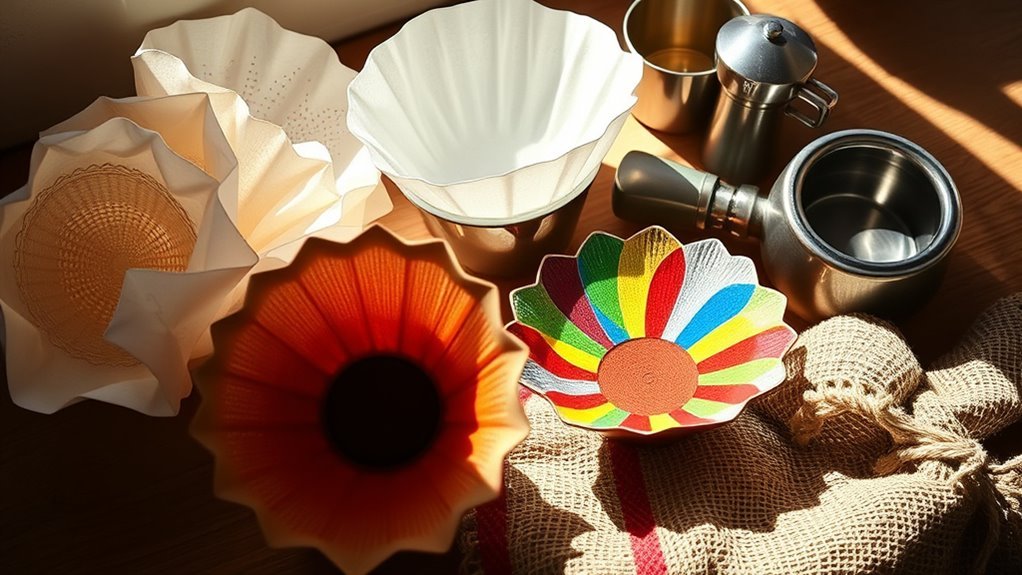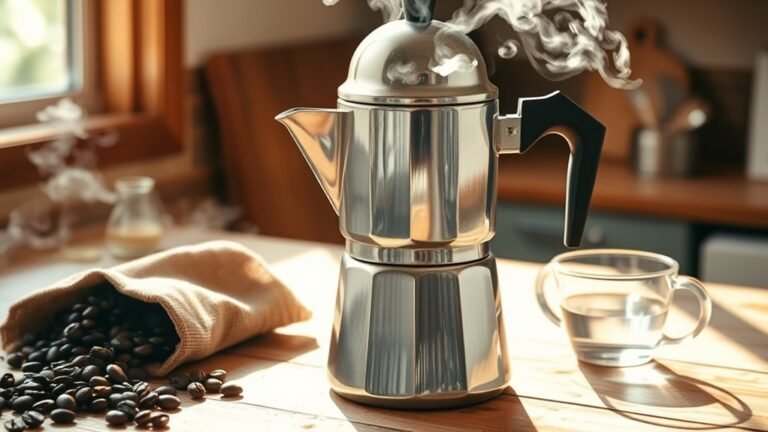Exploring Different Types of Coffee Filters
When exploring coffee filters, you’ll find paper filters deliver clarity by trapping oils and sediment, while metal filters let through more oils for fuller flavor complexity. Cloth filters offer a balance by retaining oils but reducing sediment, requiring upkeep to prevent mold. Cone-shaped filters promote even extraction versus basket filters’ potential unevenness. Material thickness also impacts flavor and flow rate. Choosing the right filter depends on your brewing method and taste preferences. Understanding these nuances can elevate your coffee experience greatly.
Understanding Paper Coffee Filters

Paper coffee filters are vital components in brewing, designed to separate coffee grounds from the liquid while allowing peak extraction. When you explore filter types, you’ll find paper filters vary in thickness, porosity, and shape, directly impacting your brew’s clarity and flavor profile. For example, bleached filters offer a neutral taste, whereas unbleached ones provide a subtle earthy character. Depending on your preferred brewing method—be it pour-over, drip, or Chemex—the filter’s compatibility guarantees ideal flow rate and extraction efficiency. Selecting the right paper filter grants you control over sediment retention and oil filtration, important for refining your cup’s texture and aroma. By understanding these technical distinctions, you maintain the freedom to tailor your coffee experience to exacting standards.
Benefits of Metal Coffee Filters
When you choose a metal coffee filter, you’re investing in exceptional durability and long-term use that paper filters can’t match. Its finely crafted mesh allows more oils and nuanced flavors to pass through, enhancing your coffee’s complexity. Understanding these benefits helps you optimize both the lifespan of your filter and the richness of your brew.
Durability and Longevity
Metal coffee filters can last for years, making them a cost-effective choice compared to disposable alternatives. The filter material, typically stainless steel or gold-plated mesh, resists corrosion and deformation, ensuring consistent performance over time. Unlike paper filters, which degrade after a single use, metal filters maintain structural integrity, reducing filter cost per use substantially. You won’t need to frequently replace them, which supports your freedom from constant repurchasing. Additionally, their robust construction withstands daily temperature fluctuations and mechanical stress. Proper cleaning and maintenance further extend their lifespan, allowing you to enjoy reliable filtration without sacrificing durability. By choosing metal filters, you invest in a long-term solution that balances efficiency, sustainability, and economic value—freeing you from both waste and recurring expenses.
Enhanced Flavor Extraction
Although many coffee enthusiasts favor convenience, you’ll find that using a metal coffee filter greatly enhances flavor extraction by preserving essential oils and fine particulates often trapped by paper filters. This retention distinctly influences the flavor profile, allowing you to experience a richer, more complex cup. Unlike paper filters, metal ones permit a controlled flow rate and maintain the integrity of your brewing techniques, which is vital for revealing nuanced taste notes. By allowing micro-grounds and oils to pass through, metal filters enable a fuller body and intensified aroma. If you value freedom in your brewing process, metal filters offer a consistent extraction method without sacrificing subtlety, ultimately elevating your coffee’s character beyond what disposable filters can achieve.
Using Cloth Coffee Filters
When you use cloth coffee filters, you’ll benefit from their ability to retain essential oils while reducing sediment for a cleaner cup. Proper maintenance, including thorough rinsing and drying, is vital to prevent mold and extend filter life. Understanding these care requirements guarantees consistent performance and ideal flavor extraction.
Benefits of Cloth Filters
Because cloth coffee filters combine fine filtration with reusability, they offer distinct advantages over paper and metal alternatives. When you use cloth filters, you gain enhanced control over extraction, as the porous textile allows ideal oil retention while filtering out fine grounds. This results in a balanced, flavorful cup that respects the coffee’s nuance. From a sustainability perspective, cloth filters reduce waste considerably, as they can be used repeatedly, cutting down on the disposable paper filters that contribute to landfill volume. Additionally, cloth’s natural fibers biodegrade more efficiently than synthetic options, aligning with eco-conscious coffee brewing. Choosing cloth filters means embracing a method that supports both superior taste and environmental responsibility, giving you freedom from single-use constraints without compromising on quality.
Maintenance and Care
To maintain ideal performance and longevity of your cloth coffee filters, you need to establish a regular cleaning routine that prevents residue buildup and preserves the fabric’s integrity. After each use, rinse the filter thoroughly with hot water, avoiding soap that can leave residues. For deeper cleaning, boil the filter periodically to eliminate oils and odors. Proper filter storage is critical—dry the filter completely and store it in a breathable container to prevent mildew. Monitor your filters for wear and discoloration; timely filter replacement guarantees maximum extraction and flavor.
| Task | Frequency | Tips |
|---|---|---|
| Rinsing | After every use | Use hot water, avoid soap |
| Boiling | Weekly | Boil for 10 minutes to remove oils |
| Drying | After rinsing | Air dry completely, avoid enclosed spaces |
| Storage | After drying | Use breathable containers |
| Filter Replacement | Every 3-6 months | Inspect fabric for thinning or stains |
Comparing Cone-Shaped and Basket Filters
Two primary types of coffee filters dominate the market: cone-shaped and basket filters. When you opt for a cone filter, you leverage its advantages, such as promoting even water flow and extraction due to the single, pointed design. This shape encourages coffee grounds to bed uniformly, enhancing flavor clarity and strength. Conversely, basket filters often struggle with less consistent water distribution, a key basket filter disadvantage. Their flat-bottom design can cause channeling, leading to uneven extraction and a muddier taste profile. If you value precision and control in your brew, the cone filter advantages become essential. However, basket filters, while convenient for larger volumes, may limit your freedom to optimize taste. Understanding these technical differences empowers you to choose a filter that matches your brewing style and flavor preferences.
How Filter Materials Affect Coffee Taste
Although the shape of your coffee filter influences extraction dynamics, the material it’s made from plays an equally critical role in determining the final taste. Filter thickness affects how quickly water passes through, directly impacting brew temperature stability and extraction efficiency. Thicker filters slow flow, allowing more contact time, which can enhance flavor clarity but risk over-extraction if brew temperature isn’t managed precisely. Conversely, thinner filters promote faster flow and a brighter cup but might let through fine coffee particles, altering mouthfeel. Materials like paper absorb oils and sediment, producing a cleaner, crisper profile, while synthetic fibers or metal mesh retain more oils, resulting in fuller body and complexity. Understanding these material properties lets you tailor your brew to your flavor freedom, balancing filter thickness and brew temperature for peak extraction.
Reusable Vs Disposable Coffee Filters

Choosing between reusable and disposable coffee filters markedly impacts not only flavor extraction but also sustainability and maintenance routines. Reusable filters, typically made from stainless steel or cloth, offer the reusable benefits of reduced waste and long-term cost efficiency. They allow more oils and fine particles to pass through, enhancing coffee’s body and complexity. However, they require diligent cleaning to prevent buildup and preserve flavor integrity. On the other hand, disposable filters—usually paper—excel in disposable convenience: they’re single-use, easy to discard, and demand no cleaning. They produce a cleaner cup by trapping more oils and sediments, which some prefer for a brighter profile. Your choice hinges on balancing environmental impact, maintenance willingness, and desired flavor clarity, ultimately granting you the freedom to tailor your brewing experience precisely.
Specialty Filters for Espresso Machines
How do specialty filters for espresso machines influence your shot quality? Choosing the right espresso filter types directly affects extraction consistency, crema formation, and flavor clarity. Specialty filters are engineered to optimize water flow and pressure, essential for advanced espresso brewing techniques.
Specialty espresso filters enhance shot quality by improving extraction, crema, and flavor through optimized water flow and pressure.
Consider these key features when selecting your filter:
- Precision perforation patterns: Control flow rate to enhance extraction uniformity.
- Material composition: Stainless steel or gold-plated filters resist corrosion and maintain thermal stability.
- Basket size variations: Tailor dose capacity for single or double shots.
- Specialty brewing techniques compatibility: Filters designed for pressure profiling or pre-infusion systems.
Cleaning and Maintaining Coffee Filters
You need to follow precise cleaning techniques to remove residual oils and coffee particles that can clog your filter and impact taste. Regular maintenance, including thorough rinsing and occasional deep cleaning with specialized solutions, guarantees peak performance. By adhering to these practices, you’ll greatly extend your filter’s lifespan and maintain consistent brew quality.
Proper Cleaning Techniques
Although coffee filters might seem disposable, proper cleaning techniques can greatly extend their lifespan and guarantee optimal brewing performance. To maintain ideal filtration and flavor clarity, you need to establish a disciplined cleaning frequency and guarantee appropriate filter storage. Follow these steps for best results:
- Rinse immediately after use with hot water to prevent coffee oil buildup.
- Use a mild detergent sparingly; avoid harsh chemicals that degrade filter material.
- Soak reusable filters periodically in a solution of water and white vinegar to dissolve residues.
- Air-dry filters fully before storing in a clean, dry container to prevent mold and odors.
Filter Maintenance Tips
Three essential practices guarantee your coffee filters remain effective and durable: regular cleaning, proper drying, and careful storage. Depending on the filter types—metal, paper, or cloth—you’ll need tailored cleaning methods. Metal filters require thorough scrubbing to remove oily residues, while cloth filters benefit from soaking and occasional boiling to eliminate trapped grounds. After washing, confirm filters are completely dry to prevent mold growth and maintain brewing quality. For filter storage, keep them in a clean, dry environment away from contaminants and moisture. Storing filters in airtight containers or dedicated compartments preserves their integrity and readiness for use. Adhering to these maintenance tips guarantees each brew is consistent, freeing you to enjoy coffee without compromise.
Extending Filter Lifespan
Maintaining your coffee filters properly lays the foundation for extending their lifespan considerably. To maximize filter reuse and guarantee peak performance, you need to adopt precise cleaning and storage techniques. Here’s what you should focus on:
- Rinse filters immediately after use with hot water to prevent oil buildup.
- Use a mild detergent or specialized coffee filter cleaner for deep cleaning.
- Allow filters to air-dry completely in a well-ventilated area before filter storage to avoid mold growth.
- Store filters in an airtight container away from moisture and strong odors.
Environmental Impact of Different Filters

When evaluating the environmental impact of different coffee filters, you need to take into account factors such as material composition, biodegradability, and manufacturing processes. Biodegradable options, including compostable filters made from natural fibers like unbleached paper or bamboo, greatly reduce landfill waste and support environmental sustainability. These filters break down efficiently in composting environments, minimizing their carbon footprint compared to synthetic or plastic-based alternatives. Conversely, non-biodegradable filters contribute to long-term pollution and higher emissions during production. Additionally, the energy and water consumption involved in manufacturing these filters affect their overall ecological impact. By choosing filters with low environmental costs, you exercise greater freedom in reducing your coffee routine’s footprint, aligning your brewing habits with sustainable practices without compromising convenience or quality.
Choosing the Right Filter for Your Brewing Method
Understanding the environmental impact of your coffee filters is important, but selecting the right filter also depends heavily on the brewing method you use. Different brewing preferences demand specific coffee filter types to optimize extraction and flavor clarity. For instance, pour-over brewers benefit from paper filters that trap oils, producing a cleaner cup. Meanwhile, metal mesh filters preserve more oils, enhancing richness for French press enthusiasts. Here’s how to align filter choice with your method:
- Pour-over: Use cone-shaped paper filters for balanced clarity.
- French press: Opt for stainless steel mesh filters to retain oils.
- Aeropress: Choose either paper or metal filters based on flavor intensity.
- Cold brew: Coarse cloth or reusable mesh filters prevent sediment.
Selecting the right filter maximizes your brewing freedom and coffee quality.
Frequently Asked Questions
Can Coffee Filters Be Used for Cold Brew Coffee?
Imagine your cold brew as a gentle river, flowing smoothly through the right filter. Yes, coffee filters can be used for cold brew methods, but filter compatibility is key. Paper filters work well, trapping fine grounds yet allowing slow extraction, preserving flavor clarity. Metal or cloth filters offer reusable options but differ in filtration precision. Choosing the right filter means you control the taste, texture, and freedom of your perfect cold brew experience.
Do Coffee Filters Affect Caffeine Content in Coffee?
You’ll find that filter types do influence caffeine extraction, but not drastically. Paper filters tend to trap more oils and fine particles, slightly reducing caffeine levels in the brew. Metal or mesh filters allow more oils and micro-grounds through, resulting in a marginally higher caffeine content. However, the biggest factors affecting caffeine extraction are grind size, brewing time, and water temperature—not just your choice of coffee filter. Choose what suits your taste freedom.
Are There Coffee Filters Designed for Travel Use?
Yes, there are travel friendly filters specifically designed for portable brewing. These filters are often made from durable, reusable materials like stainless steel mesh or silicone, ensuring they withstand the rigors of travel. Their compact design allows you to brew quality coffee anywhere without bulky equipment. By integrating these filters into your setup, you maintain freedom and flexibility, enjoying fresh coffee on the go without compromising on extraction quality or convenience.
Can Coffee Filters Be Used to Strain Other Beverages?
Yes, coffee filters offer impressive beverage versatility beyond coffee. Depending on the filter materials—paper, metal, or cloth—you can strain teas, cold brews, or even homemade nut milks efficiently. Paper filters excel at trapping fine particles, while metal ones allow more oils through, affecting flavor and clarity. By understanding these material properties, you gain freedom to experiment with diverse beverages, ensuring you achieve the desired purity and texture every time.
How Do Coffee Filters Impact Brewing Time?
You’ll notice brew speed varies with filter material; paper filters slow extraction by trapping fine grounds, creating resistance, while metal filters allow faster flow with larger pores, speeding up brewing. Fabric filters balance permeability and retention, affecting brew time moderately. Understanding these dynamics lets you control brew speed precisely, tailoring extraction to your taste. Choosing the right filter material empowers you to optimize brewing time and flavor extraction without compromise.






